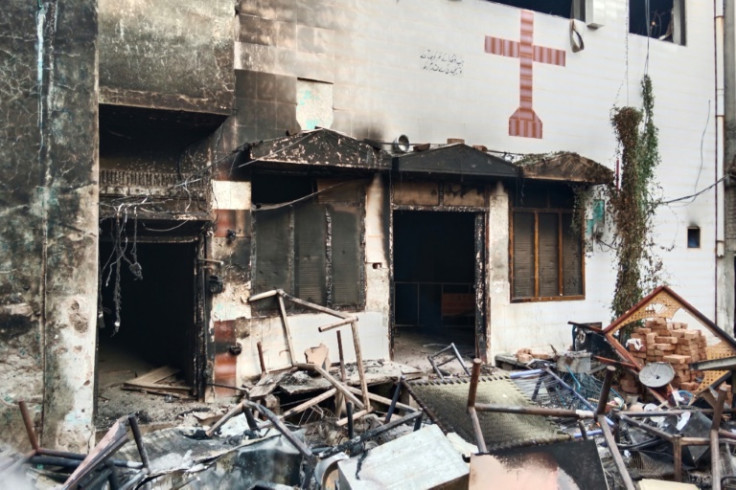Christian churches, homes set on fire in Pakistan over Quran desecration allegations
The violence broke out after clerics made announcements inciting the mob.

An angry mob set ablaze at least five churches in Pakistan's Punjab province on Wednesday after two people from the area were accused of committing blasphemy.
The mob went on a rampage after torn pages of the Quran were discovered in a Christian colony in Jaranwala tehsil, located in the Faisalabad district of Punjab.
The violence erupted after mosque announcements accused a Christian man and his sister of committing the act. The videos that have gone viral on social media showed people armed with batons and sticks attacking churches and setting the furniture and copies of the Bible on fire.
The vandalised churches included the Salvation Army Church, United Presbyterian Church, Allied Foundation Church and Shehroonwala Church situated in the Isa Nagri area.
The mob also demolished the house of the man accused of blasphemy, according to local media reports. The houses of several other Christians living in the area were also set on fire. Many families ran away from their houses, seeking shelter at their relatives' houses.
The police have booked both the brother and sister in the case. However, no FIR has been registered against the ransacking and burning of the churches.
"Police booked both brother and sister under 295-C and 295-B of Pakistan Penal Code and constituted a police team for their arrest," Jaranwala City Police Station official Asif Ali told PTI.
Section 295 B makes desecration of a copy of the Quran punishable with imprisonment for life, while Section 295 C makes insulting the Prophet punishable with life imprisonment or the death penalty.
Meanwhile, Pakistan's Interim Prime Minister Anwaar ul Haq Kaka has assured strict action in the case. "I am gutted by the visuals coming out of Jaranwala, Faisalabad. Stern action would be taken against those who violate the law and target minorities. All law enforcement has been asked to apprehend culprits & bring them to justice. Rest assured that the government of Pakistan stands with our citizenry on an equal basis," read a statement from the prime minister.
Words fail me as I write this. We, Bishops, Priests and lay people are deeply pained and distressed at the Jaranwala incident in the Faisalabad District in Pakistan. A church building is being burnt as I type this message. Bibles have been desecrated and Christians have been… pic.twitter.com/xruE83NPXL
— Bishop Azad Marshall (@BishopAzadM) August 16, 2023
This is not the first such incident that has occurred in Pakistan. The country has often seen people resort to violence to punish those accused of blasphemy.
Pakistan has some of the harshest blasphemy laws in the world, which have attracted sharp criticism from rights groups. Minority communities, including Islamic sects, face frequent persecution in the Muslim-majority country, where the state religion is Islam.
Recently, Pakistan protested against the desecration of the Holy Quran in Sweden. The Pakistani government observed Yaum-e-Taqaddus-e-Quran (the day to uphold the Holy Quran's sanctity) last month.
It is said that the Quran was revealed to the prophet Muhammad in 610 CE on the occasion known as Laylat al-Qadr, frequently translated as "the Night of Power." The burning of the book is considered deeply offensive by the Muslim community.
In 2021, a 48-year-old Sri Lankan factory manager in Sialkot was beaten to death, and his body was set ablaze by a mob for alleged blasphemy. The mob had accused Priyantha Kumara of removing a poster bearing words from the Quran from the walls of the sports equipment factory where he used to work as a general manager.
The videos, which later made it to social media, showed Kumara being chased onto a roof, beaten with sticks, and stripped before being set ablaze by a bloodthirsty mob.
In 2017, an angry mob lynched university student Mashal Khan, who was found to have been falsely accused of blasphemy. In 2015, Muslims beat to death a Christian couple and burned their bodies in a brick kiln for allegedly desecrating the Quran.
A court in Pakistan sentenced two Christians and a Muslim to death for blasphemy in 2016. The three men were said to have made derogatory remarks against Prophet Muhammad in an audio recording. At least 84 people were accused of committing blasphemy in 2021, according to data provided by the Centre for Social Justice.
© Copyright IBTimes 2025. All rights reserved.






















